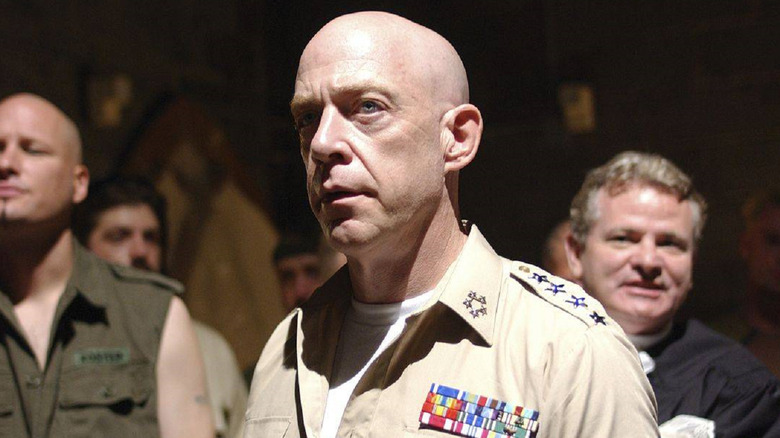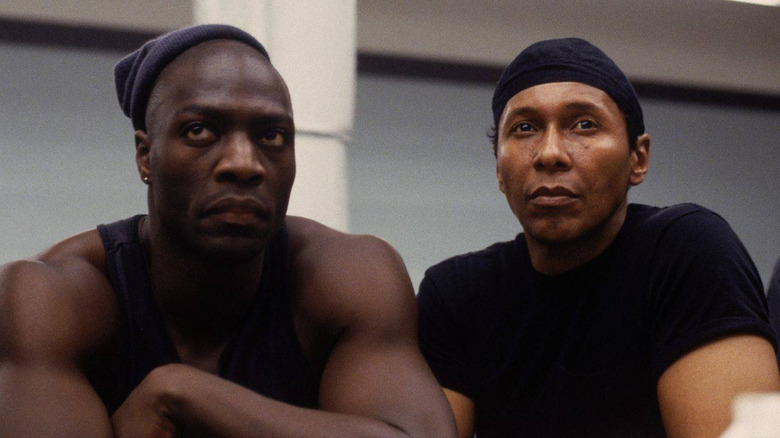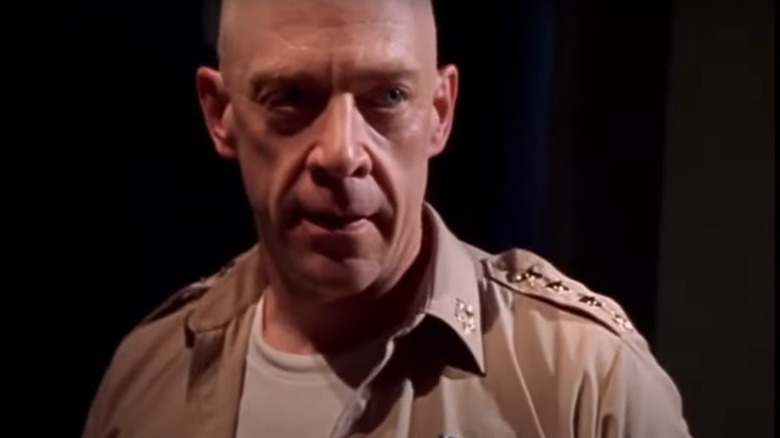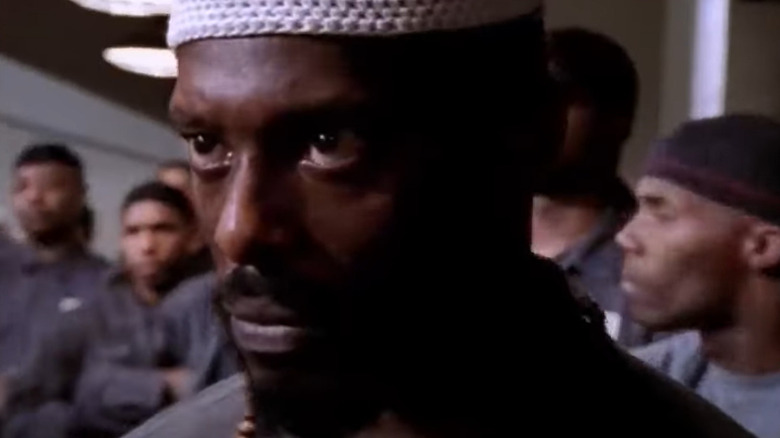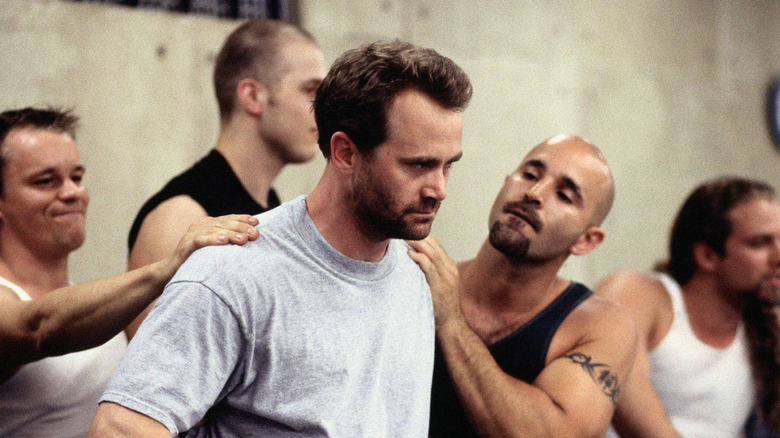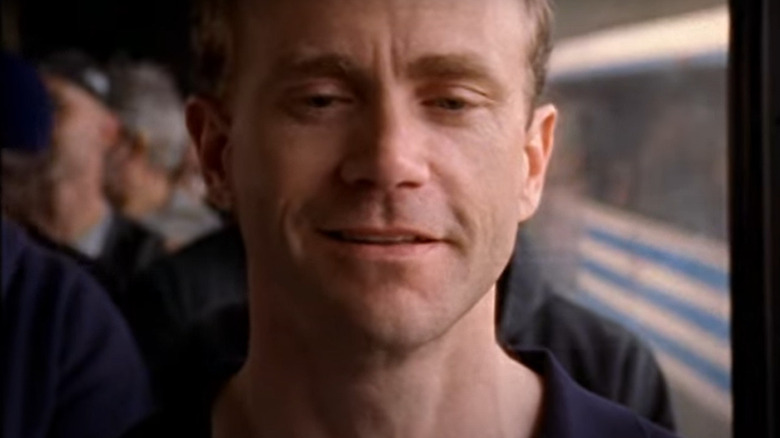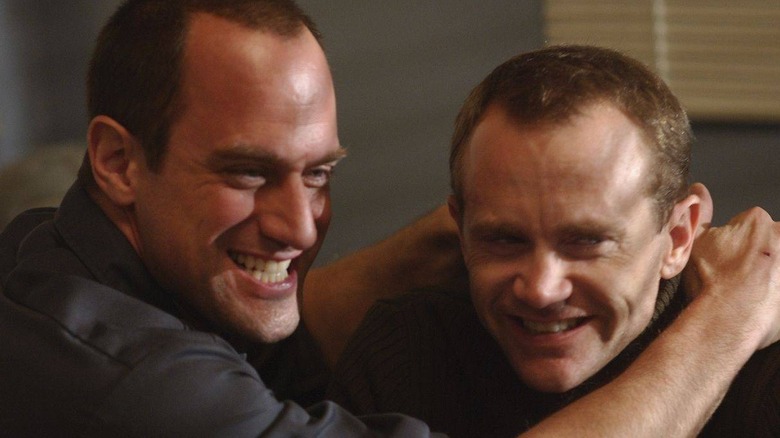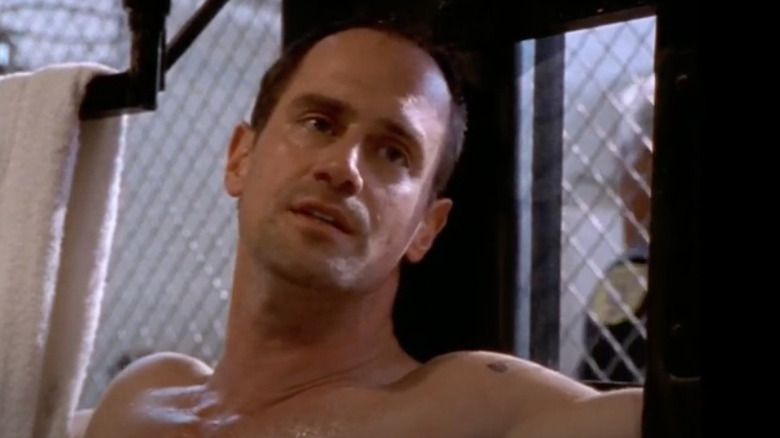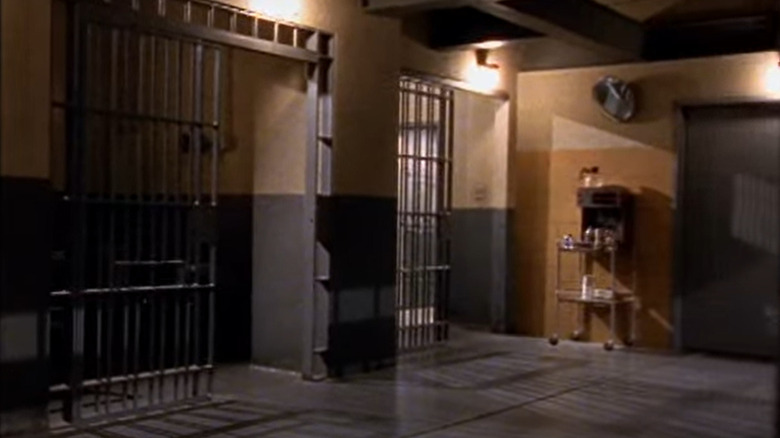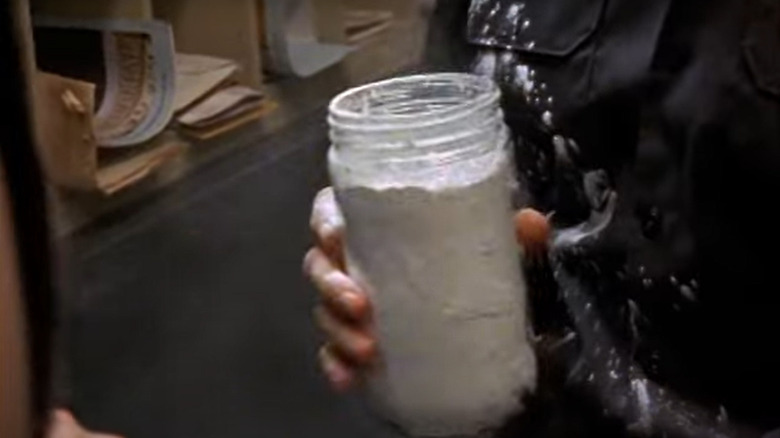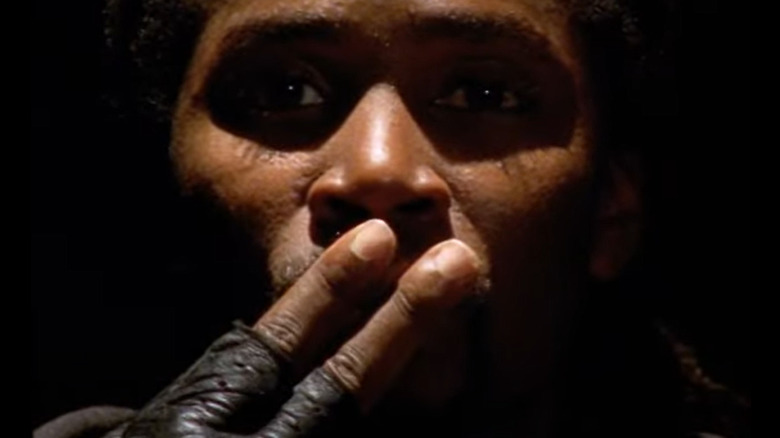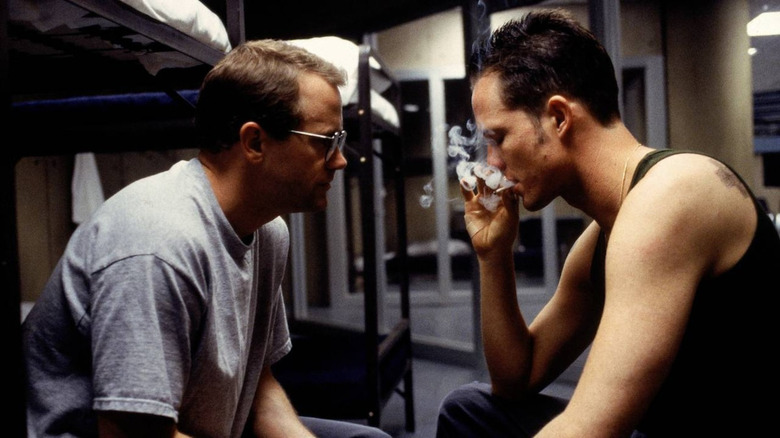The Ending Of HBO's Oz Finally Explained
Before there was "Prison Break" and "Wentworth," there was HBO's prison drama "Oz." Regarded as one of the first shows of its kind as well as a staple of the channel's legacy dramas, its six seasons follow inmates and officers at the Oswald State Correctional Facility. Rife with racism, discrimination, and violence, "Oz" never shies away from elements of gritty controversy. More than 20 years later, viewers have not forgotten exactly what made it noteworthy of cultural significance.
At the same time, a few missteps along the way kept "Oz" ultimately out of the memory of the turn of the millennium's Golden Age of Television. Its final season — and final episode — were openly criticized for being out of their depth, with the writing and individual character storylines being called into question. Even though so much time has passed, there are still plenty of questions that remain unanswered, leaving fans to stew on what could have been the bigger meaning behind it. Here's exactly what you need to know about the ending of "Oz."
Spoilers ahead.
Things changed after Simon Adebisi's death
Though Episode 8 of Season 6 is where things officially wrap up, the ending of "Oz" arguably starts at a much earlier point. Up until Season 4, the character of Simon Adebisi is one of the show's main players, acting as the center of a key story arc while serving a life sentence for the beheading of a cop. Over his time on "Oz," he rises up to become the leader of the Homeboys gang, suffers from severe heroin withdrawal, and later incites trouble with a stolen gun. Adebisi ends up dying of wounds following an altercation with Said in his cell after the latter's loyalty is called into question.
Although Adebisi doesn't directly have much to do with the show's eventual closing moments, some Reddit users believe that his death was the first signal of the beginning of the end. Though many of his scenes are considered to be fan favorites, others agree that the death itself is "absolutely epic" — which perhaps was a decision that was utilized too soon for this reason. Considered one of the most dangerous inmates on the show, Adebisi's presence might have been able to improve the finale, at least in the minds of some fans.
Schillinger gets what's coming to him
One of the characters who survives until the eventual end of "Oz" is Vernon Schillinger, the main antagonist of Tobias Beecher's storyline. Introduced in the pilot episode of Season 1, his ardently racist reputation helps him hang onto his position as the head of the Aryan Brotherhood within the prison. Known for his tendencies to humiliate, sodomize, and incite violence, Season 6 sees Schillinger's release from solitary confinement which spearheads a full-blown race war. In short, it's increasingly difficult to feel sorry for a man who thinks so little of literally everybody else.
Though "Exeunt Omnes" arguably doesn't deliver much for long-term viewers, it does provide one satisfying ending as Schillinger meets his maker. Keller devises a plan to get rid of him in the name of winning back Beecher's love, humiliating him within the prison's final play. It's just desserts to see Schillinger get the treatment that he has evaded for so long. Even better — it comes back to play into the hands of Beecher, who is never charged with his death.
The show's grittiness feels overdone
When "Oz" first burst onto TV screens, it set itself apart with its willingness to tackle the unsaid. Staring social issues such as racism, incarceration, and antisemitism in the face, the show's style was a far cry from previous prison shows such as "Porridge" or "Prisoner Cell Block H." When "Oz" was canceled in early 2003, creator Tom Fontana told CNN that his idea was to "really to go to a place that had never been explored in fictional television and tell as many good stories as I could possibly tell."
While this approach was incredibly effective in its earlier seasons, it might have left a lot to be desired as "Oz" wrapped up. Reddit user Ziggy-Sane cites the eventual grittiness as becoming "nonsensical and stupid," with user1688 offering the opinion that the show was ahead of its time yet missed the mark when it mattered. It's possibly a case of too many cooks spoiling the broth, with the final episode trying to pack in every possible kind of violent drama. The storytelling that Fontana wanted to focus on gets lost, with characters such as McManus straying far from the direction fans expected them to end up in.
Ryan's sins push him too far
Very few of the final storylines in "Oz" find any kind of resolution, but Ryan is an exception to the rule. Another character introduced in the pilot, his highly intelligent yet ruthless personality sees him running drugs, receiving a cancer diagnosis, and getting romantically involved with one of the prison doctors. Though the first few seasons focus on his penchant for violence, his arc in Season 4 onwards switches to a path of personal redemption. With an Irish-American background, his links to both religion and strict power dynamics are never too far away, which leads fans to learn more about his estranged parents.
While his mother is a 1960s radical on the run, Ryan's relationship with his father begins healing through the loss of his disabled brother (and fellow inmate) Cyril. It's a heartbreaking moment to see Ryan's realization of a world without Cyril, with romantic interest Dr. Gloria Nathan doing the best she can to comfort him. Though this romantic interlude is a nice touch, it's the bond between father and son that ultimately saves the day. Ryan's ability to forgive and forget sends him forward on a new path, healing from old wounds that are possibly left behind the prison walls.
The path to redemption ran dry
With so much going on in the Season 6 finale of "Oz," it can be difficult for fans to make sense of what's actually going on. While the show wraps up and the inmates unexpectedly move on from the familiarity of their own prison walls, viewers are arguably looking for any kind of redemption for the characters still left. However, many fan favorites fail to live up to expectations. Brass turns the tables by getting arrested while trying to harm Jackson Vahue, while Pablo stabs another inmate and ends up in the hole. Miguel ends up under the influence of drugs thanks to his cellmate Torquemada, with Cyril's heartbreaking end leaving Ryan (and others) in distress. As far as fulfilling endings go, "Oz" lands miles away.
Though some Reddit users claim that the show had always been flawed, that didn't seem to bother many of them as much until the final episodes of "Oz." Season 6 has continued to draw criticism for alleged sloppiness, with many viewers saying they simply can't make sense of the plot. With the show dwindling, the expected trajectory of sinner-done-good could have been a dependable and satisfying option, with only Beecher arguably making this work.
Mukada is the light at the end of the tunnel
It's expected that the final storylines in "Oz" would come with their fair share of dark baggage, but characters such as Schillinger, Miguel, and McManus largely become consumed by the worst of the worst. The same can't exactly be said for Mukada, whose final scenes offer a sense of heart and understanding into the show's otherwise faltering format. As the go-to chaplain of the penitentiary, Mukada has mostly been shy when it comes to physical conflict, becoming heavily invested in the emotional and mental standings of the inmates instead. Typically holding good intentions to heart, he develops acute anxiety that's made worse after being taken hostage by Miguel in Season 2.
He returns to the prison in Season 6, and sexual assault allegations against him are ultimately dropped. The season's storyline sets Mukada up to find his way back to his mother, with the finale showing the pair reconnecting in a loving and tender reunion. Amidst all of the grief, murder, and unknown outcomes, Mukada's parting notes unexpectedly leave us with the sense of anchoring hope we've been looking for, achieved simply by putting bygones aside to work past misunderstanding. Maybe this is also what reinspires his need to put the prisoners first, as he doesn't tell anyone when Cloutier's body is found.
How meaty were the plotlines?
For any long-running drama to succeed, characters and worldbuilding are crucial. This is especially true for any program that tries to position itself as groundbreaking – which is something "Oz" never shied away from. To a certain extent, some shows can't help but age badly, yet "Oz" might've held up better if it had stayed committed to its meatier plotlines. In TV world, a show is only as good as its last performance, meaning greats such as "Game of Thrones" and "Gossip Girl" are associated with their unpopular endings.
The same can arguably be said for the Season 6 finale of "Oz." Reddit users have suggested that the show is "ridiculous" from its inception, but simultaneously recognize that the show runs out of steam in the run-up to its closing moments. In the case of "Exeunt Omnes," its narrative journey can be viewed as "anticlimactic." With "Oz" hitting the floor running in Season 1, it could be said that the pacing stays at one consistent rate rather than upping the stakes. Pairing this with character storylines that feel absurd — such as Keller's final betrayal of his romantic interest Beecher – it's easy to see why some fans got frustrated as the show drew to a close.
Keller meets a grisly end
First introduced part way through Season 2, Chris Keller quickly makes a name for himself. Another character central to Tobias Beecher's storyline, Keller switches his early alliance with the Aryan Brotherhood to betraying them, ultimately leading to his romantic entanglement with Beecher. This sense of connection continues at the start of Season 6, with Beecher helping Keller successfully appeal his death sentence. When they later become cellmates, Beecher finds out Keller set him up with illegal drugs, and an intense confrontation ends with Keller falling over a railing to his death.
For fans that had been invested in the pair's relationship, Keller's death isn't exactly what they might have been hoping for. What makes it more twisted is that Beecher ends up evading sentencing for his actions, largely thanks to the mass poisoning of the Aryans. There are no signs of remorse either, with his parting shot being the smile on his face. Though Keller's actions toward Beecher were obviously hideous, there's certainly some moral ambiguity lying behind both sides of the wildly toxic relationship.
The temporary move makes Oz a ghost town
Thanks to the brutal yet potentially unexpected poisoning of the Aryans, Oz can no longer function as it once used to. Though many deaths are on the hands of those left, each section of the prison ends up being evacuated in the season finale's final moments. McManus can be heard saying that the move is "only temporary," maintaining a certainty that they "will be back someday." Viewers are then left to draw their own conclusions as to what happens next, while the episode airs haunting images of cells and recreation rooms left vacant.
Despite there not being any clarity, it's a safe bet that Oz becomes a ghost town. It's arguably smart to leave a few loose ends unanswered — ultimately meaning that the show could be picked up in some form at a later date — but some viewers consider the closing moments both "abrupt" and a "lazy" choice. There's also an element of it being unbelievable, with the events leading up to the prison's evacuation not likely to be in line with real prison procedures of the time. At the same time, "Oz" occasionally learns toward surrealism and has never been known to play by the rules. However unsatisfying the closing shots are, they are in line with what we know "Oz" to be.
The Aryans ending is more cryptic
One thing the Season 6 finale of "Oz" brings with it, aside from confusion, is a lot of deaths. Before the prison gets evacuated into extinction, the rest of the Aryan Brotherhood is entirely wiped out. Before his death, Keller tells Beecher that he has taken care of the gang, and a mysterious package arrives at the post office after his death. There's a cryptic, cloak-and-dagger nature to that final plot point, with the contents revealed to be a poisonous powder that kills all who come into contact with it.
As well as being one of the more potent scenes in the Season 6 finale, it's also the most far-fetched. The likelihood of a highly toxic and illegal package penetrating the prison feels almost comedic, while also downplaying the idea that any of the inmates are the shrewd felons that we believe them to be. Reddit user treblah3 also suggests that the storyline doesn't take into account the anthrax scare of 2001, meaning a package full of powder in 2003 would have caused severe alarm. It's these small details not adding up that make the finale of "Oz" fall on its sword, no matter how entertaining it might be.
It made the best of a bad situation
Though it's easy to call the final episode out on its mistakes, it isn't all bad news for the "Oz" finale. There's a feeling of making the best of a bad situation, given the fact that some fans feel the show has its real farewell toward the end of Season 4. According to Reddit user OG-Dropbox, there could also have been speculation around the time of filming Simon Adebisi's death that the show might be canceled straight after, prompting the creators to write a compelling narrative that would have ended "Oz" on an explosive parting note.
Regardless of the situation, it's not difficult to pinpoint when "Oz" took a turn for the worse. That being said, "Exeunt Omnes" still provides a sense of light and shadow. At its core, the episode delivers everything a season finale should — high drama, tearful goodbyes, joyous reunions, and a sense of wrongs being corrected. Though the individual storylines might not have been up to par with the striking narratives that shaped the first few seasons, the bare bones had intentions in the right place, making the "Oz" finale watchable many years on.
Could there be an Oz reboot or spinoff?
Though there have been plenty of trips down memory lane for the core cast of "Oz," nobody has ever been able to pin down a potential return for the series. With the show drawing to a conclusion 20 years ago, it could be said that if a return was going to happen, fans would have seen it by now. However, though fans have voiced their sorrow over the years, the industry's penchant for resurrecting bygone shows means that "Oz" is never completely out of the running.
In terms of narrative, it remains completely plausible that a reboot or spin-off of "Oz" could resurface. The show arguably needs to address the elephant in the room that is the supposedly temporary evacuation of the prison. Though we watched plenty of main characters meet their maker, we never got an answer for what happens after the hasty retreat. At the same time, "Oz" could go on to explore Ryan's relationships with Gloria and his father, Mukada's next moves following the reunion with his mother, and what becomes of Beecher after he gets away with his debatable involvement with Keller and the remaining Aryans' deaths.
